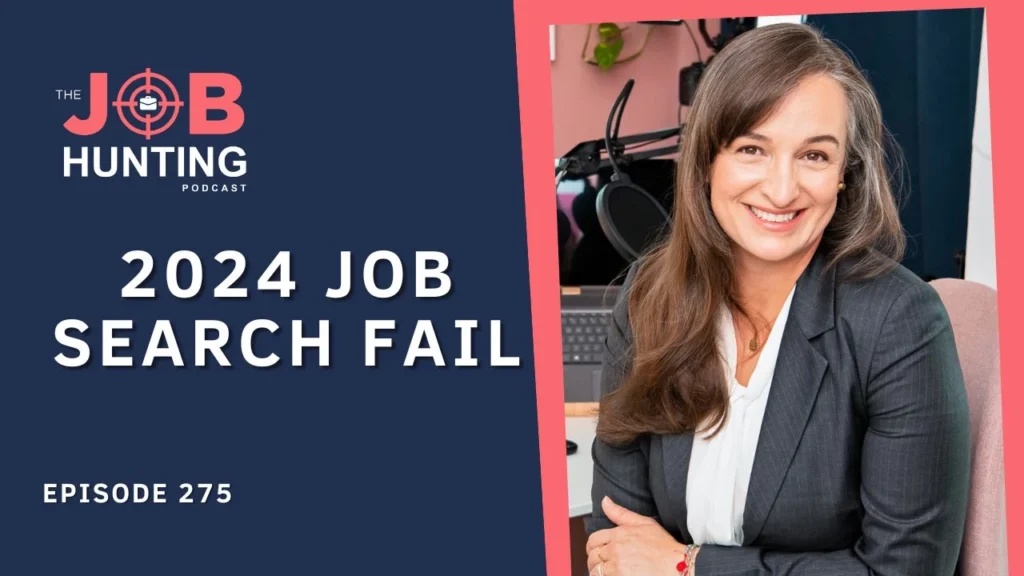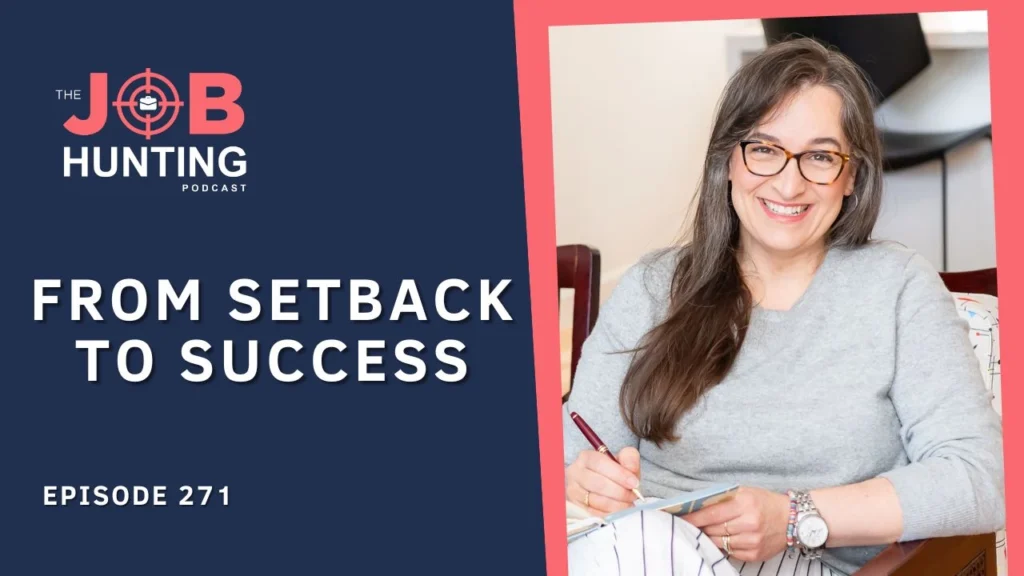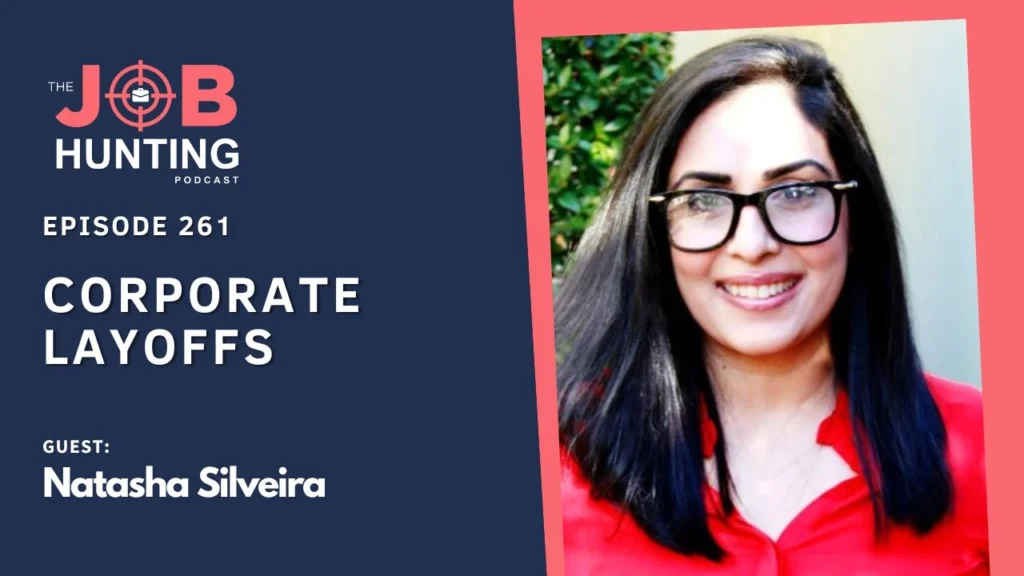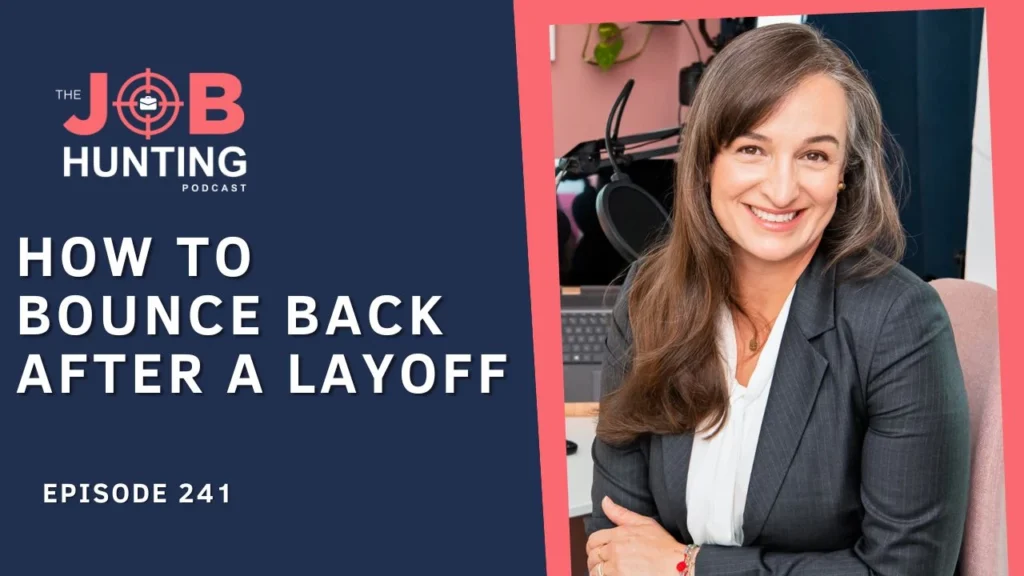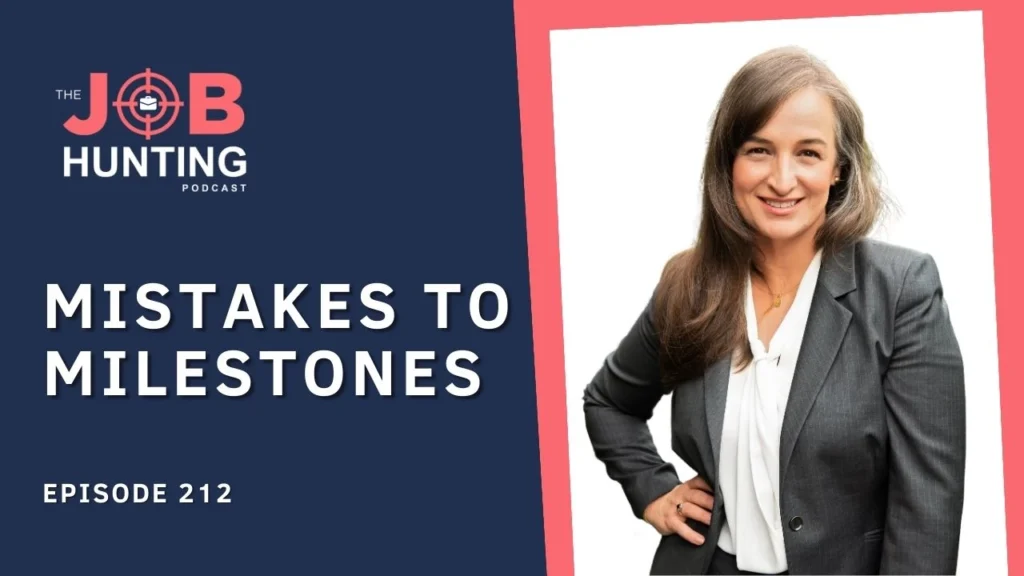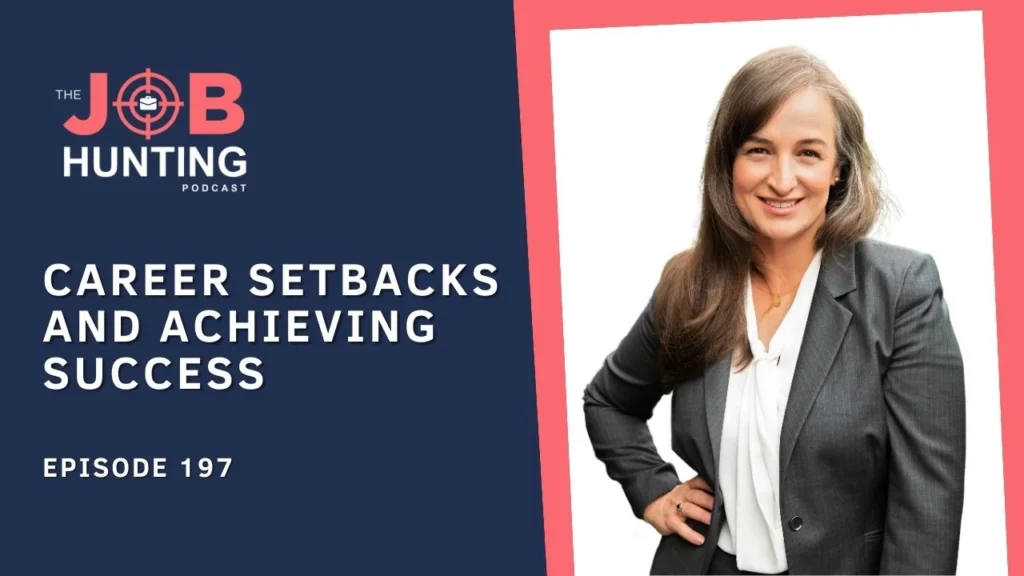Renata (00:01)
So you have experienced just how awful it was to look for work in 2024. Or you may have had to look for a new job several times in the past few years with the pandemic and the post pandemic job market being quite challenging for you, your profession, your industry and where you live. You don’t want to go through this alone anymore. The good news is
that you have found the right resource in this episode of the Job Hunting Podcast to help you. I will share with you three steps that will ensure that you accelerate your job search in 2025 and move faster towards your next job and career goals. And no, I will not tell you to be more active on LinkedIn or learn how to use the star situation, task, action, and result.
to answer your job interview questions. Both strategies are wrong, especially when applied to more experienced professionals like the ones that I often work with in my coaching practice. So if you have been trying to do more LinkedIn posts and you have been following a lot of career advice you see online and people tell you and things are not working in your favor, then this episode is for you.
Renata (01:44)
Now, I don’t want to scare you, but no one honestly talks to corporate professionals about their careers like I do. And this is the one thing I need to let you know. If you don’t learn how to take control of your career, you will lose more and more control over time. So if you have been struggling to get your career progression in place, get your next job or get back to the salary range you once had,
We need to learn strategies to help you get things under control again and back on track. So in this episode, I want to show you the steps that will help you do just that.
If you have just found this episode, hello, my name is Renata Bernadi. I’m a career and executive coach based in Melbourne with clients all over the world. And I do weekly podcast episodes in the job hunting podcast to support more professionals like you and educate corporate professionals and executives in taking better care of their careers.
My goal is for you to be in the driver’s seat of your career, not your employer. If you want to learn more about my story, how I became a coach and the services that I offer, please check my website renatabernardi.com. R-E-N-A-T-A-B-E-R-N-A-R-D-E.com. There’s a link to it in the episode show notes, so go check it out. Okay, so step one.
Let’s talk about the first step for you to get your next job faster and your career back on track.
Okay, so let’s talk about the first step for you to get your next job faster and your career back on track. I’m going to talk about a client example. This person contacted me on LinkedIn, connected with me on LinkedIn. She had lost her job and she wanted to follow me on LinkedIn, which is fine. I told her about the podcast and that was it. She did not become a client. She told me in her LinkedIn message that
work had provided her with some resources and she was going to follow that and see how it went. A year later, she came back to me. She had followed lots of advice. She had followed advice from her colleagues, mentors, partners. She had used some of the resources that work had provided when they made her role redundant, but still she did not get a job. I’m talking about
10 to 12 months after she lost her job, she came back to me and she really wanted to work with me and we worked together first to provide her with a baseline of how to look for a job, the etiquette of recruitment, the best practices when doing job applications and interviews, the best templates that she could use. Then we moved on to tailoring it to her specific country. She was not in Australia, I’m in Australia.
Her industry, her sector, the level of seniority that she was in, in her job and her personality as well, adapting it to make sure that it was unique to her and felt natural to her when she was speaking and talking about herself. She found a job. Now she lost 10 to 12 months of income just by going around in circles, following advice that were not following a protocol for success.
I want you to keep that in mind. I’m going to go back to that at the end of this episode. Now, what is step one? You need to better understand how recruitment and selection works and how you as a job candidate fit into that. Okay? It’s not about what you used to do in your job and what you will be doing in your job in the future. It’s the spirit in your life where you are a job candidate and you’re
working with recruiters and HR professionals and decision makers to get hired again. This is step one and this leads me to step two because you may be feeling completely overwhelmed like my client was. You might be experiencing conflicting results, no results, negative results by using the tips you are receiving from a variety of sources and this can potentially increase your stress.
increase your level of uncertainty, start making you doubt yourself, doubt that you’re even going to get a job. When you don’t understand how recruitment works, and I’m not talking about the job you do, I’m talking about recruitment. I know you know how to do your job, but recruitment is different and it can feel like the world has abandoned you and you might be feeling guest-lighted in this recruitment and selection process, in the job hunting process.
When you don’t have a job, you may not also have the self-discipline to search for work consistently. All of these issues can also affect your chances of success when you’re looking for jobs. So what we do in my coaching business is that we follow a protocol, a framework that takes you from A to B. It’s a structured way to work. So, you know, you have all the information and you have
all the information in the correct order. You know what to do before and after each milestone in the job search process. Even if you already know some of these concepts, you may not know all of them. And even if you do know all of them, you may not be doing them in the correct order.
Just listen to some of the episodes that I have recorded with recruiters and you will see that they have a very particular way that they want to engage with job candidates. And they just feel like job candidates should know this, but frankly, they do not. And you may not know these as well. So step two is follow a framework that works. Okay. By following a structure and acquiring all the knowledge you
Preload the learning about recruitment and selection before you go to market and not whilst you’re actually doing it Which can be so overwhelming when you go to market you are going to feel ready Confident you have the knowledge, you know What’s going to be expected of you at each point of the recruitment and selection process? You are in the know together with them. You will also
start to identify which steps you have been doing right in the past. So you’re gonna look back at your job search strategy that you’ve been doing so far. And you will be able to also understand what you’ve been missing out, doing wrong, not as good or not at all. And you will be able to start correcting your job search strategy and seeing the results that you so wish to see, which is getting a new job, doing that career advancement, doing that career transition.
that you want to do. This will lead you faster into your goals by having the knowledge to do this career advancement, this career change and the job search successfully. Okay, now let’s talk about step three. What is step three? You may have all the knowledge in the world about recruitment and selection and how it works.
you have that rational, that theoretical understanding of the step-by-step of how to get a new job.
But if you don’t know yourself, you won’t be able to fully engage with the process. You need to learn more about yourself, reconnect with yourself. So step three is about knowing yourself and knowing how to talk about yourself. I see so many amazing clients, really experienced professionals that really struggle to talk about themselves. And that’s a necessary
strategy in job search and recruitment and selection. So in order to achieve this, I developed a personal portfolio for my clients, which has seven chapters and my clients working on private coaching or group coaching, they all follow these portfolios and they do this homework of writing in their personal portfolios after each module that we do.
step-by-step is part of my signature coaching program, Job Hunting Made Simple. You will find that on my website. I have spent more than a decade working on this resource, the personal portfolio, and I constantly updated and improve it. I am proud to say, to my surprise, that when my clients finish the coaching program with me, the personal portfolio and the self-reflection and self-understanding that they have
quiet through that experience is what they mentioned to me the most. It’s something you don’t know you need to do until you have done it. Nobody comes to me and say, I need to write about myself and I need to learn about myself and do this exercise. Nobody even knows that they need to do this. But once you do it, you look back and you think, wow, yes, this was transformational for me and I’m so glad that we’ve done it. That’s the biggest feedback I get.
time and time again with my clients. If anything, I ask you to stop journaling and writing about your needs, your wants, your goals, your dreams and achievements so far, your likes and dislikes. The key is to do it, is to do it regularly, to be methodical about writing things down, especially when things start shifting as they will in terms of your goal and aspirations for your future.
So for example, one of my clients in the group coaching program, his personal portfolio was not going so well for him. And by module three, that’s the third chapter in the personal portfolio, he realized that, wait a minute, this is actually not my voice. This is the voice of my parents, of society’s expectations of what I should be doing.
And he went back to module one and homework one and did it all over again, knowing now what he really truly wanted to do with his career and his life from that point onwards. And his testimonial is on my website. So if you go to the Job Hunting Made Simple landing page, you will see it’s one of the testimonials there because it was so empowering for him. And also a very common scenario I see often in my coaching practice that people
don’t know anything about themselves at all. They haven’t really worked on it and written it down to know how to explain to others what their strengths are, what their talents are, what they want with their careers, what their future goals are. And once you start this self-reflection exercise, you will uncover your true voice. You will uncover a lot of things that you had forgotten about yourself.
And job search may be your immediate problem and the reason why you tapped to listen to me talk about it right now. But what is causing the problem for you?
You see, understanding yourself and the factors that may have contributed to your job loss, your challenge in getting a new job above and beyond, knowing all the steps and the order of the steps, what’s happening in the environment that’s contributing to, you know, your job search being longer than you imagined. But is there anything we need to resolve internally within you to get you over the line?
Let’s work on that because that could also be negatively impacting your job search, especially in a competitive market. So you have a candidate that really understands what he wants to achieve or what she wants to achieve and one that’s uncertain, guess who’s going to get the job first, right? So we need to work on that, especially in a competitive market. There could be a source of dissatisfaction at work with you.
or with your boss, with your colleagues, with the sector you’re in. This could be because you are in the wrong sector or in the wrong industry for your talents, or because there is a need to risk kill or up skill that you may have overlooked in the past. And now we need to work on that. And this is when things get more tailored in the coaching practice that I do and more bespoke.
for your individual situation. And we can only get there if we go through step three, getting to know yourself. And I need to know you and you need to know yourself for that step to work and for us to work together to develop a great solution for your situation. I want to go back to the client who spent a year trying to do things by herself before working with me.
That is a huge loss of income for somebody, quite frankly, that had a job that was in the market. It wasn’t like an unusual sector or industry or profession or anything like that. So yes, maybe you do need a break after losing your job. And I often recommend people to take at least three weeks off, you know, to really take a break and rest your brain. Then you need to do the job search, which
normally would take about three months, right? And you need to account for that, have a budget for that, and make sure that you’re not being too optimistic about your chances when the average is 12 to 13 plus weeks. You know, for some more senior roles could be even a little bit longer. I understand that. But even in the worst, the worst job markets, 2024 was a really difficult job market.
My clients were working faster towards their goals and getting jobs. actually improved my conversion from 80 something to 80, 90 something. I can’t remember now. I spoke about it in a previous episode, but I improved my conversion of clients getting jobs before finishing their coaching practice with me in 2024. The toughest year to look for work in decades.
Right. So I know that my clients are doing better than their counterparts, their other colleagues job hunting. So investing in coaching that works is a really important investment that you need to take seriously before you spend 10 months without an income. And then you look back and you think, well, that didn’t work. And now I have no money to invest in coaching that can actually help me get a job.
Okay, so how to start, where to start. Now you know that job hunting may not be easy, but it is simple. There is a protocol to follow. There is knowledge that you can acquire to help you. And the good news is that I have the answers if you’re willing and ready to work on your career goals. I will talk about that soon. But first, let’s go back and talk about your typical advice that I mentioned in the beginning for job seekers in 2025.
Things like improve your LinkedIn and you will get a job. Learn how to answer questions using star format and you will be fine. That’s not true. Not in the way that you think it is. If you do LinkedIn activity without a plan, without knowledge about what’s expected of a professional of your caliber on LinkedIn, if you’re just copying what you see done by others, if you’re following advice that’s not designed for your profession, for your…
country, for your industry, for the level of management that you’re in, you could be doing more harm than good. That’s why when people do LinkedIn audits with me, they have to fill out a little questionnaire so I know how to give the best possible advice for them. I need that information. Sometimes too much LinkedIn activity is just as bad as no activity at all. Right. And we need to get more
What sort of career progression are you seeking to get? What company, what’s the culture of the companies that you’re targeting? Where in the world are you looking for work? And that will then become a more bespoke LinkedIn profile and activity that will help optimize your profile and not get in the way of you getting a job.
Same goes to following the star format, know, situation, task, action, result. That format is sometimes affecting negatively the people that come to me to start working with me. They’ve been following it and they’re not getting jobs. And my understanding of it is this, it may be affecting your executive presence. If you become too mechanical in…
using the star format to answer every question, you may not be reading the room. You may not be able to engage in conversation that’s expected, especially for senior professionals, right? You might be coming across too artificial and too over-prepared and not feeling comfortable in the room to just have a…
good conversation that goes backwards and forwards between you and your audience, the people that are interviewing you. So again, context in this job interview preparation is needed for you to know how to best engage with the interviewer. Is it the HR business partner interviewing you? Is it the recruiter interviewing you? Is it the future manager? What is the company culture?
What are the instructions that they send you? All of this is needed for you to be at your best in interviews and making sure that you prepare according to the people and what they expect to hear from you. Okay, so let’s do a recap. We now know that step one to get a job in 2025 is you need to better understand how recruitment and selection works and how you as a job candidate fit into it.
Then step two is you need to follow a framework that works. One that takes you from no job to a job, from one career to another, from one industry to another, from working in one country to another. You need to understand that there is a protocol that you can follow to get there. And step three, you know yourself, you can talk about yourself. This is really crucial when going through the interviewing process.
Now, job hunting and career planning and design is my expertise, is what I specialize in. You may be an expert in something else. You might be an accountant, an engineer, a marketing manager, any other professional. This is my expertise, is what I love to do. And I have private and group coaching clients in Australia, in the US, in the UK, in Europe, in the Middle East, Asia. You get it.
If you are ready to work on your career, please learn more about my programs, especially my signature program, Job Hunting Made Simple. It is available in three formats. It can be an online course where you have all of the content and you do it by yourself. It can be a group coaching program where you do it together with other professionals that just like you are in the job search at the moment.
or you can do it as a private coaching client. The group coaching program starts on the 4th of March of 2025 for seven weeks and is my most popular program. Go to the link in the show notes to learn more about it and contact me if you have any questions. You can find me on my website, there’s a contact form. You can find me on LinkedIn, you can send me a DM. I am here for you.
If you’re not sure which one works best for you, don’t hesitate to give me a call, send me a message. Don’t forget to also subscribe to this podcast wherever you find it. Go check out the website and please keep in touch. Bye for now. I’ll see you next time. Bye.


